Chapter 1 Introduction
1.1. DCPS Overview
1.1.1 Basic Concepts
1.1.1.1 Domain
1.1.1.2 DomainParticipant
1.1.1.3 Topic
1.1.1.4 DataWriter
1.1.1.5 Publisher
1.1.1.6 Subscriber
1.1.1.7 DataReader
1.1.2 Built-In Topics
1.1.3 Quality of Service Policies
1.1.4 Listeners
1.1.5 Conditions
1.2 OpenDDS Implementation
1.2.1 Compliance
1.2.1.1 DDS Compliance
1.2.1.2 DDSI-RTPS Compliance
OpenDDS RTPS Implementation Notes
1.2.2 Extensions to the DDS Specification
1.2.3 OpenDDS Architecture
1.2.3.1 Design Philosophy
1.2.3.2 Extensible Transport Framework (ETF)
1.2.3.3 DDS Discovery
Centralized Discovery with DCPSInfoRepo
Peer-to-Peer Discovery with RTPS
1.2.3.4 Threading
1.2.3.5 Configuration
1.3 Installation
1.3.1 Building With a Feature Enabled or Disabled
1.3.2 Disabling the Building of Built-In Topic Support
1.3.3 Disabling the Building of Compliance Profile Features
1.3.3.1 Content-Subscription Profile
1.3.3.2 Persistence Profile
1.3.3.3 Ownership Profile
1.3.3.4 Object Model Profile
Chapter 2 Getting Started
2.1 Using DCPS
2.1.1 Defining the Data Types
2.1.2 Processing the IDL
2.1.3 A Simple Message Publisher
2.1.3.1 Initializing the Participant
2.1.3.2 Registering the Data Type and Creating a Topic
2.1.3.3 Creating a Publisher
2.1.3.4 Creating a DataWriter and Waiting for the Subscriber
2.1.3.5 Sample Publication
2.1.4 Setting up the Subscriber
2.1.4.1 Initializing the Participant
2.1.4.2 Registering the Data Type and Creating a Topic
2.1.4.3 Creating the subscriber
2.1.4.4 Creating a DataReader and Listener
2.1.5 The Data Reader Listener Implementation
2.1.6 Cleaning up in OpenDDS Clients
2.1.7 Running the Example
2.1.8 Running Our Example with RTPS
2.2 Data Handling Optimizations
2.2.1 Registering and Using Instances in the Publisher
2.2.2 Reading Multiple Samples
2.2.3 Zero-Copy Read
Chapter 3 Quality of Service
3.1 Introduction
3.2 QoS Policies
3.2.1 Default QoS Policy Values
3.2.2 LIVELINESS
3.2.3 RELIABILITY
3.2.4 HISTORY
3.2.5 DURABILITY
3.2.6 DURABILITY_SERVICE
3.2.7 RESOURCE_LIMITS
3.2.8 PARTITION
3.2.9 DEADLINE
3.2.10 LIFESPAN
3.2.11 USER_DATA
3.2.12 TOPIC_DATA
3.2.13 GROUP_DATA
3.2.14 TRANSPORT_PRIORITY
3.2.15 LATENCY_BUDGET
3.2.16 ENTITY_FACTORY
3.2.17 PRESENTATION
3.2.18 DESTINATION_ORDER
3.2.19 WRITER_DATA_LIFECYCLE
3.2.20 READER_DATA_LIFECYCLE
3.2.21 TIME_BASED_FILTER
3.2.22 OWNERSHIP
3.2.23 OWNERSHIP_STRENGTH
3.3 Policy Example
Chapter 4 Conditions and Listeners
4.1 Introduction
4.2 Communication Status Types
4.2.1 Topic Status Types
4.2.1.1 Inconsistent Topic Status
4.2.2 Subscriber Status Types
4.2.2.1 Data On Readers Status
4.2.3 Data Reader Status Types
4.2.3.1 Sample Rejected Status
4.2.3.2 Liveliness Changed Status
4.2.3.3 Requested Deadline Missed Status
4.2.3.4 Requested Incompatible QoS Status
4.2.3.5 Data Available Status
4.2.3.6 Sample Lost Status
4.2.3.7 Subscription Matched Status
4.2.4 Data Writer Status Types
4.2.4.1 Liveliness Lost Status
4.2.4.2 Offered Deadline Missed Status
4.2.4.3 Offered Incompatible QoS Status
4.2.4.4 Publication Matched Status
4.3 Listeners
4.3.1 Topic Listener
4.3.2 Data Writer Listener
4.3.3 Publisher Listener
4.3.4 Data Reader Listener
4.3.5 Subscriber Listener
4.3.6 Domain Participant Listener
4.4 Conditions
4.4.1 Status Condition
4.4.1.1 Status Condition Example
4.4.2 Additional Condition Types
4.4.2.1 Read Conditions
4.4.2.2 Query Conditions
4.4.2.3 Guard Conditions
Chapter 5 Content-Subscription Profile
5.1 Introduction
5.2 Content-Filtered Topic
5.2.1 Filter Expressions
5.2.2 Content-Filtered Topic Example
5.3 Query Condition
5.3.1 Query Expressions
5.3.2 Query Condition Example
5.4 Multi Topic
5.4.1 Topic Expressions
5.4.2 Usage Notes
5.4.2.1 Join Keys and DCPS Data Keys
5.4.2.2 How Resulting Samples are Constructed
5.4.2.3 Use with Subscriber Listeners
5.4.3 Multi Topic Example
5.4.3.1 IDL and Topic Expression
5.4.3.2 Creating the Multi Topic Data Reader
5.4.3.3 Reading Data with the Multi Topic Data Reader
Chapter 6 Built-In Topics
6.1 Introduction
6.2 Built-In Topics for DCPSInfoRepo Configuration
6.3 DCPSParticipant Topic
6.4 DCPSTopic Topic
6.5 DCPSPublication Topic
6.6 DCPSSubscription Topic
6.7 Built-In Topic Subscription Example
Chapter 7 Run-time Configuration
7.1 Configuration Approach
7.2 Common Configuration Options
7.3 Discovery Configuration
7.3.1 Domain Configuration
7.3.2 Configuring Applications for DCPSInfoRepo
7.3.2.1 Configuring for Multiple DCPSInfoRepo Instances
7.3.3 Configuring for DDSI-RTPS Discovery
7.3.4 Configuring for Static Discovery
7.4 Transport Configuration
7.4.1 Overview
7.4.1.1 Transport Concepts
7.4.1.2 How OpenDDS Selects a Transport
7.4.2 Configuration File Examples
7.4.2.1 Single Transport Configuration
7.4.2.2 Using Mixed Transports
7.4.2.3 Using Multiple Configurations
7.4.3 Transport Registry Example
7.4.4 Transport Configuration Options
7.4.5 Transport Instance Options
7.4.5.1 Configuration Options Common to All Transports
7.4.5.2 TCP/IP Transport Configuration Options
TCP/IP Reconnection Options
7.4.5.3 UDP/IP Transport Configuration Options
7.4.5.4 IP Multicast Transport Configuration Options
7.4.5.5 RTPS_UDP Transport Configuration Options
7.4.5.6 Shared-Memory Transport Configuration Options
7.5 Logging
7.5.1 DCPS Layer Logging
7.5.2 Transport Layer Logging
Chapter 8 opendds_idl Options
8.1 opendds_idl Command Line Options
Chapter 9 The DCPS Information Repository
9.1 DCPS Information Repository Options
9.2 Repository Federation
9.2.1 Federation Management
9.2.2 Federation Example
9.2.2.1 Configuring the Federation Example
9.2.2.2 Running the Federation Example
Chapter 10 Java Bindings
10.1 Introduction
10.2 IDL and Code Generation
10.3 Setting up an OpenDDS Java Project
10.4 A Simple Message Publisher
10.4.1 Initializing the Participant
10.4.2 Registering the Data Type and Creating a Topic
10.4.3 Creating a Publisher
10.4.4 Creating a DataWriter and Registering an Instance
10.5 Setting up the Subscriber
10.5.1 Creating a Subscriber
10.5.2 Creating a DataReader and Listener
10.6 The DataReader Listener Implementation
10.7 Cleaning up OpenDDS Java Clients
10.8 Configuring the Example
10.9 Running the Example
10.10 Java Message Service (JMS) Support
Chapter 11 Modeling SDK
11.1 Overview
11.1.1 Model Capture
11.1.2 Code Generation
11.1.3 Programming
11.2 Installation and Getting Started
11.2.1 Prerequisites
11.2.2 Installation
11.2.3 Getting Started
11.3 Developing Applications
11.3.1 Modeling Support Library
11.3.1.1 The Application Class
11.3.1.2 The Service Class
11.3.2 Generated Code
11.3.2.1 The DCPS Model Class
11.3.2.2 The Traits Class
11.3.2.3 The Service Typedef
11.3.2.4 Data Library Generated Code
11.3.2.5 QoS Policy Library Generated Code
11.3.3 Application Code Requirements
11.3.3.1 Required headers
11.3.3.2 Exception Handling
11.3.3.3 Instantiation
11.3.3.4 Publisher Code
11.3.3.5 Subscriber Code
11.3.3.6 MPC Projects
11.3.3.7 Dependencies Between Models
Chapter 12 Recorder and Replayer
12.1 Overview
12.2 API Structure
12.3 Usage Model
12.4 QoS Processing
12.4.1 Durability details
Chapter 13 Safety Profile
13.1 Overview
13.2 Safety Profile Subset of OpenDDS
13.3 Safety Profile Configurations of ACE
13.4 Run-time Configurable Options
13.5 Running ACE and OpenDDS Tests
13.6 Using the Memory Pool in Applications
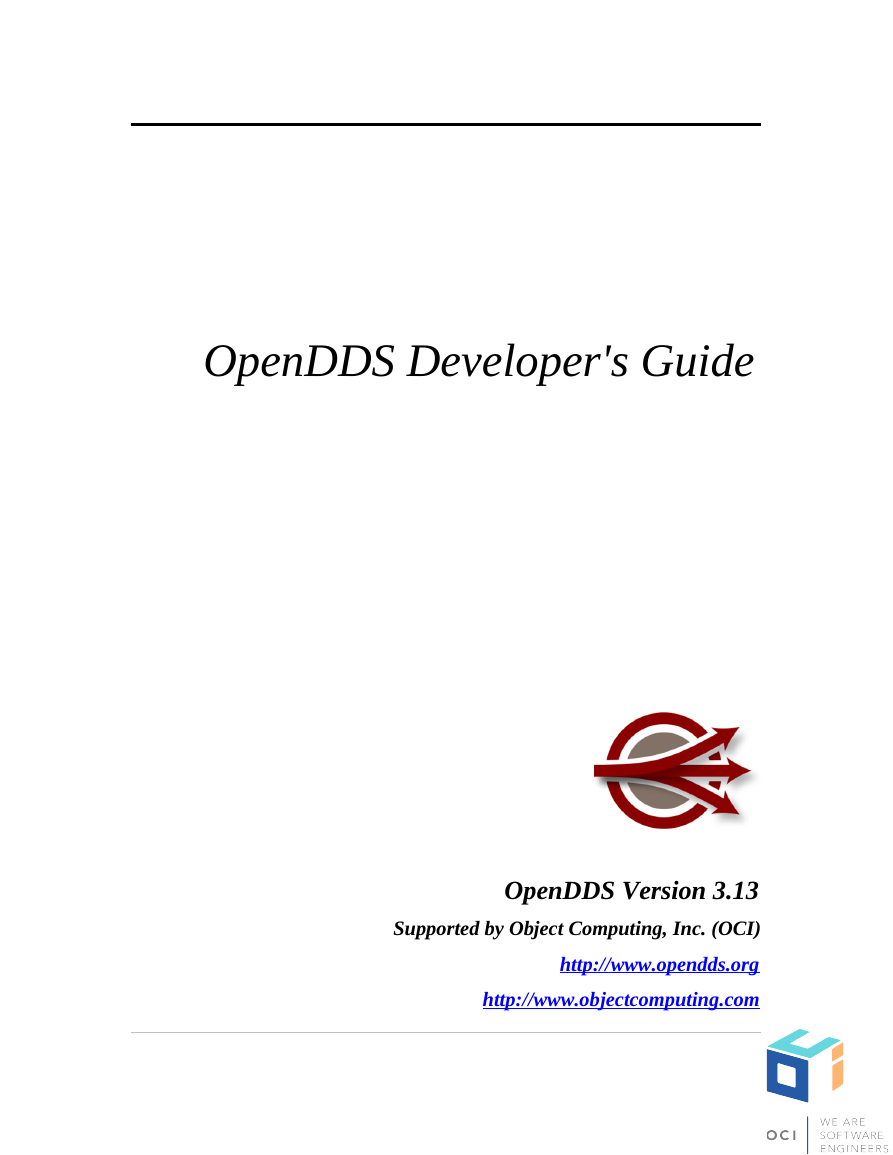
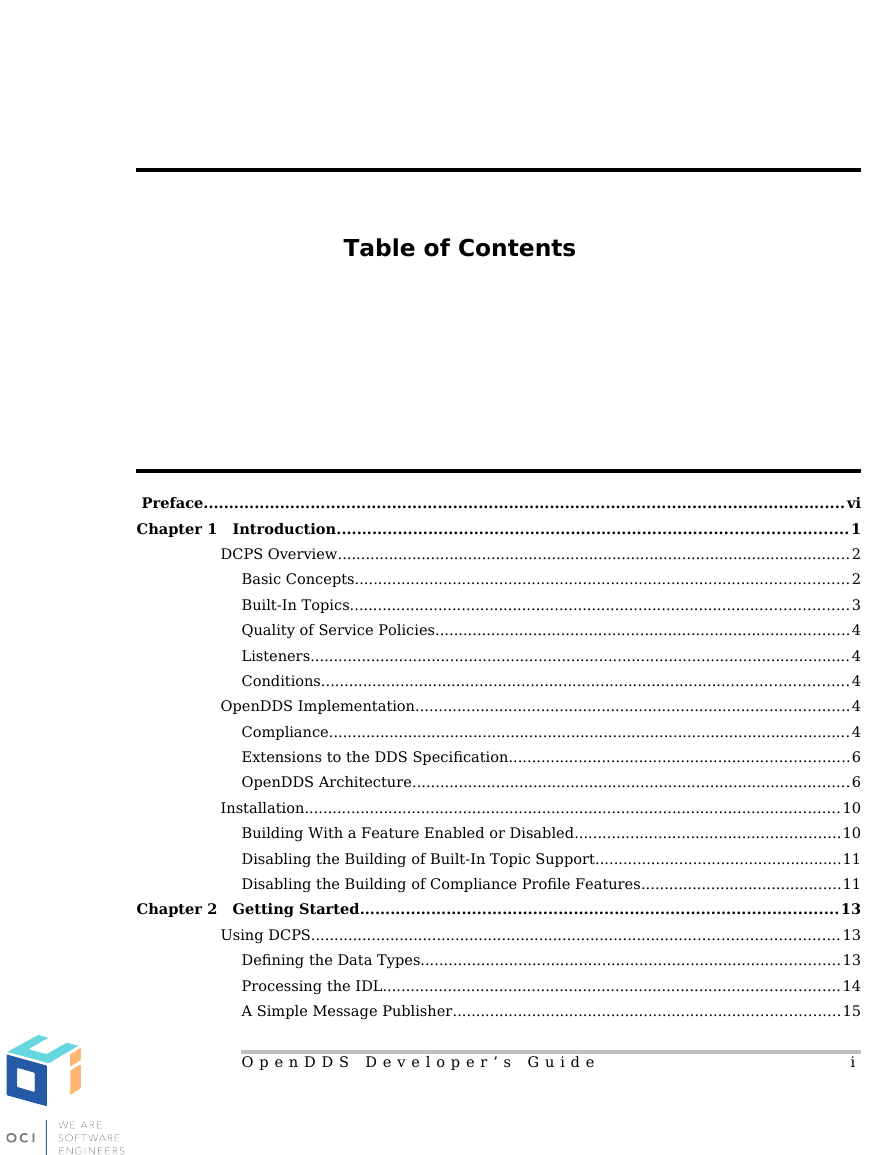
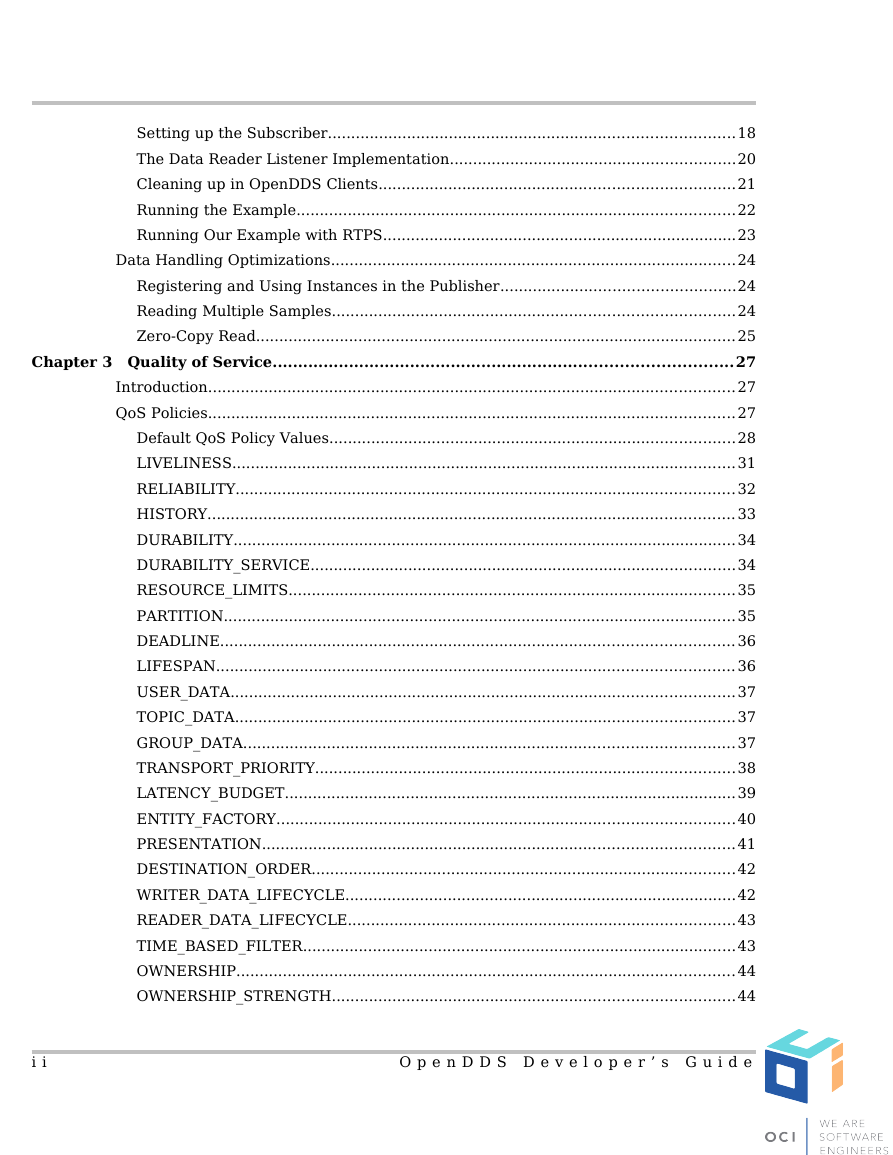
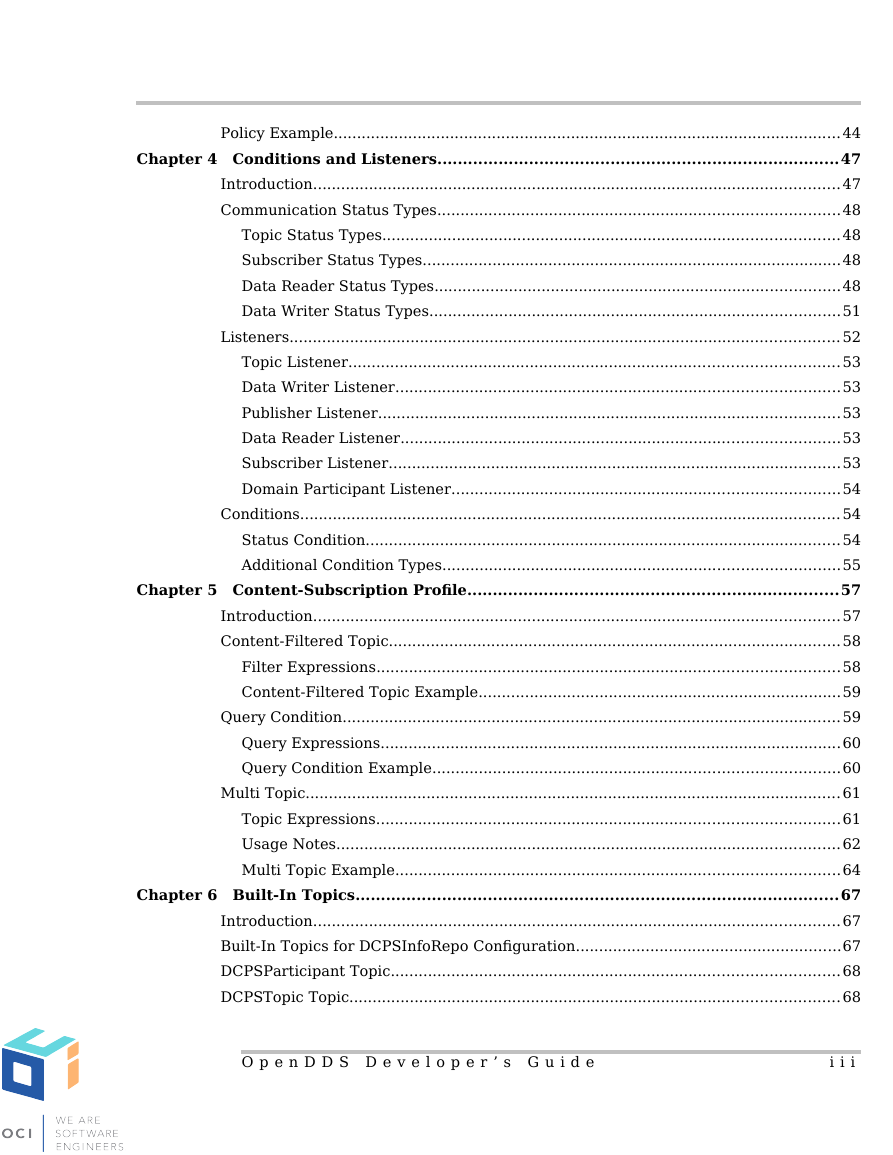
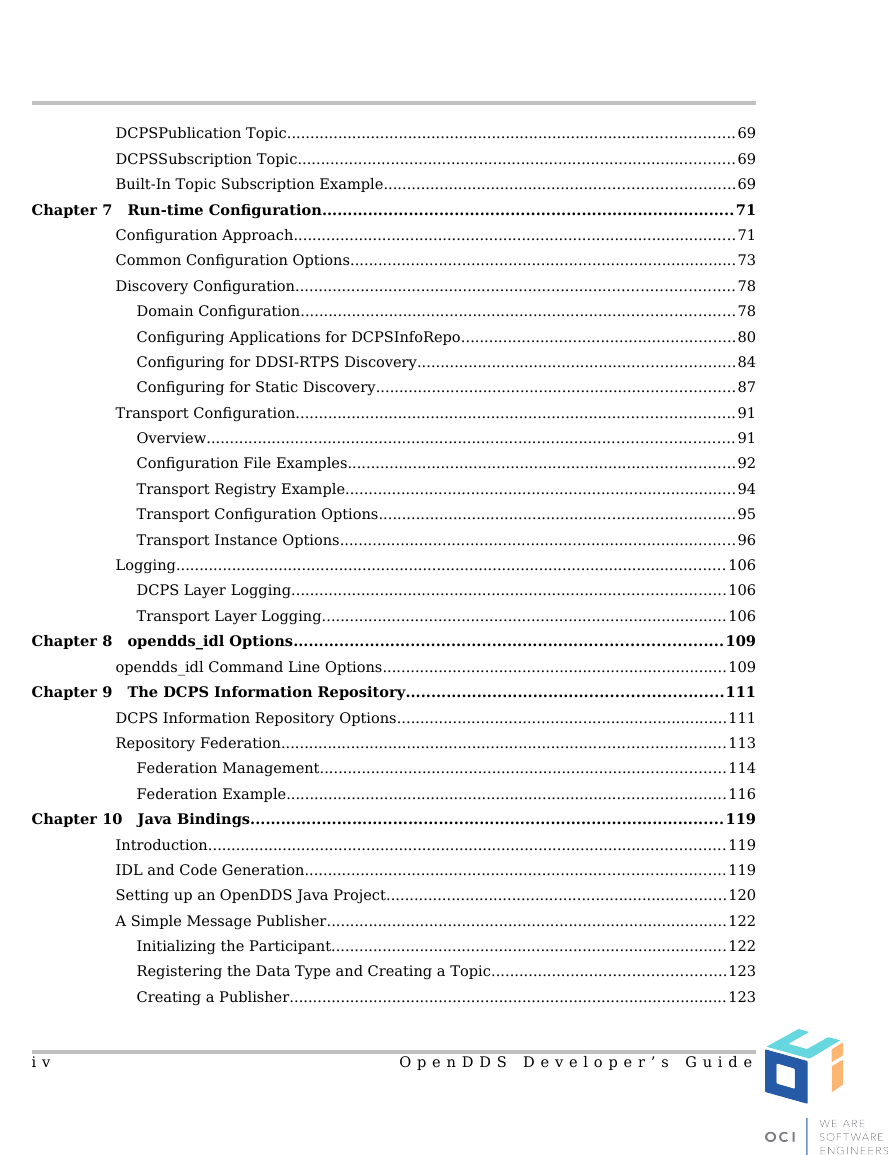
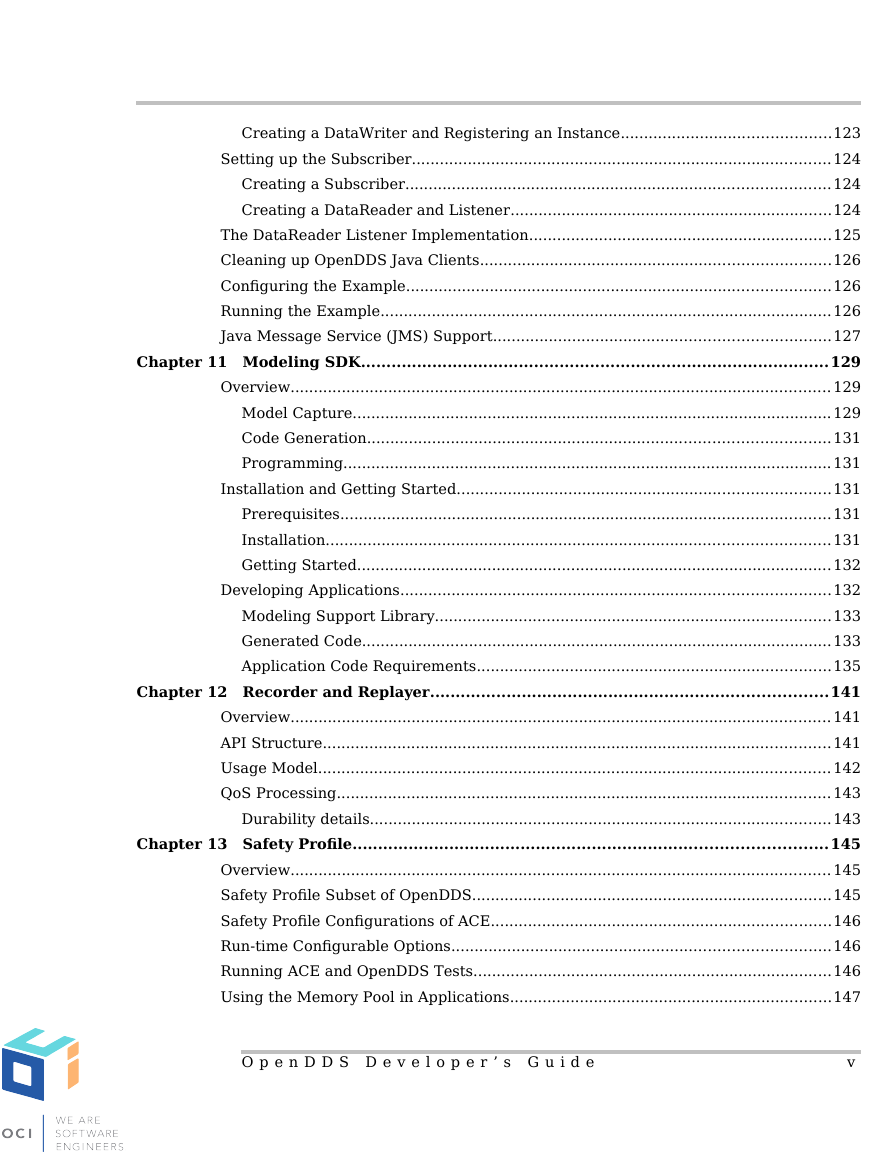
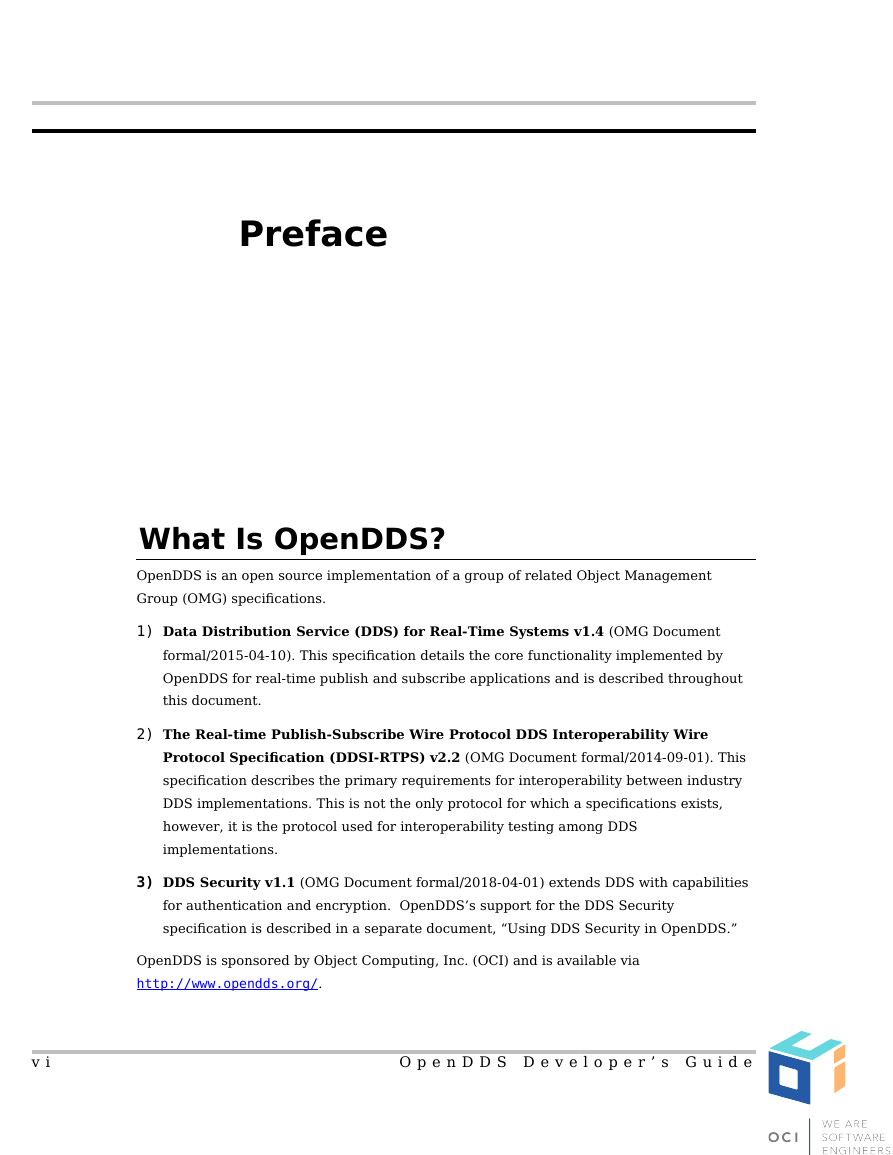
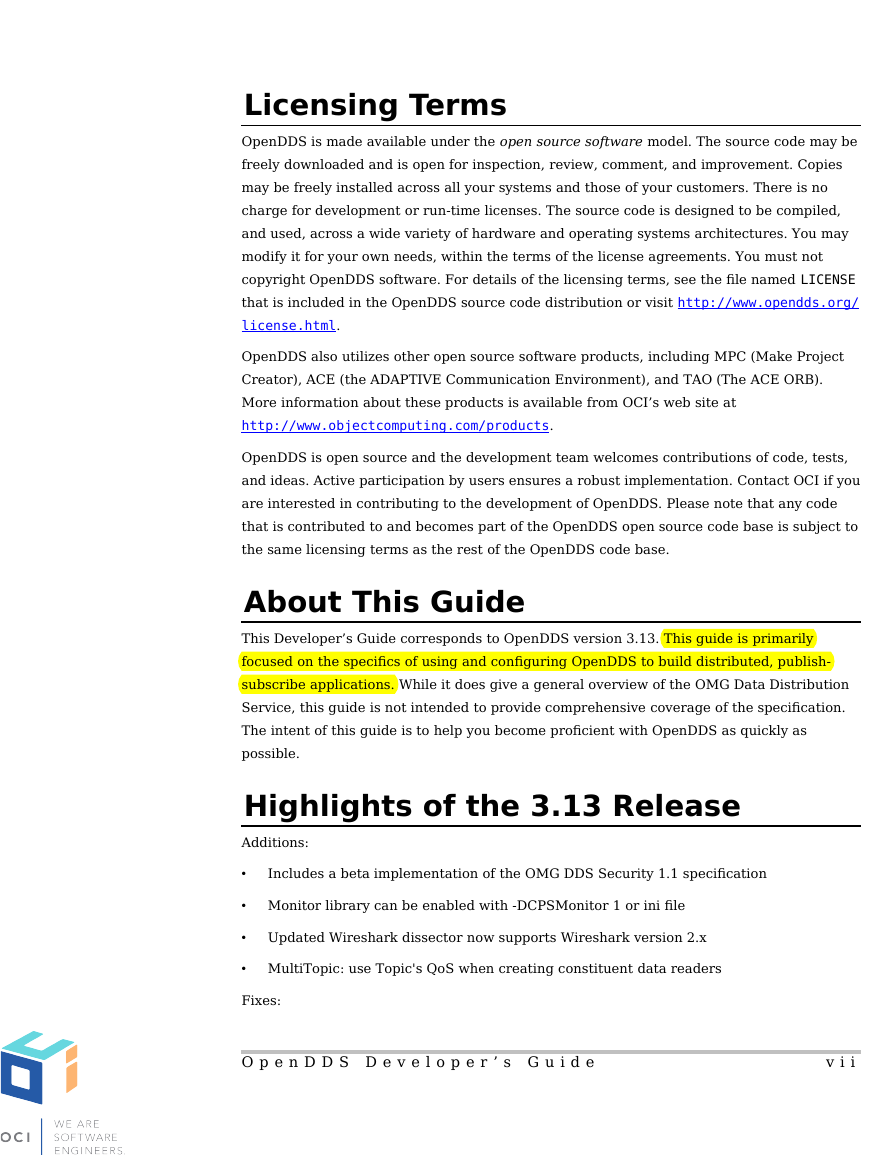








 2023年江西萍乡中考道德与法治真题及答案.doc
2023年江西萍乡中考道德与法治真题及答案.doc 2012年重庆南川中考生物真题及答案.doc
2012年重庆南川中考生物真题及答案.doc 2013年江西师范大学地理学综合及文艺理论基础考研真题.doc
2013年江西师范大学地理学综合及文艺理论基础考研真题.doc 2020年四川甘孜小升初语文真题及答案I卷.doc
2020年四川甘孜小升初语文真题及答案I卷.doc 2020年注册岩土工程师专业基础考试真题及答案.doc
2020年注册岩土工程师专业基础考试真题及答案.doc 2023-2024学年福建省厦门市九年级上学期数学月考试题及答案.doc
2023-2024学年福建省厦门市九年级上学期数学月考试题及答案.doc 2021-2022学年辽宁省沈阳市大东区九年级上学期语文期末试题及答案.doc
2021-2022学年辽宁省沈阳市大东区九年级上学期语文期末试题及答案.doc 2022-2023学年北京东城区初三第一学期物理期末试卷及答案.doc
2022-2023学年北京东城区初三第一学期物理期末试卷及答案.doc 2018上半年江西教师资格初中地理学科知识与教学能力真题及答案.doc
2018上半年江西教师资格初中地理学科知识与教学能力真题及答案.doc 2012年河北国家公务员申论考试真题及答案-省级.doc
2012年河北国家公务员申论考试真题及答案-省级.doc 2020-2021学年江苏省扬州市江都区邵樊片九年级上学期数学第一次质量检测试题及答案.doc
2020-2021学年江苏省扬州市江都区邵樊片九年级上学期数学第一次质量检测试题及答案.doc 2022下半年黑龙江教师资格证中学综合素质真题及答案.doc
2022下半年黑龙江教师资格证中学综合素质真题及答案.doc